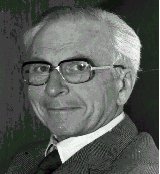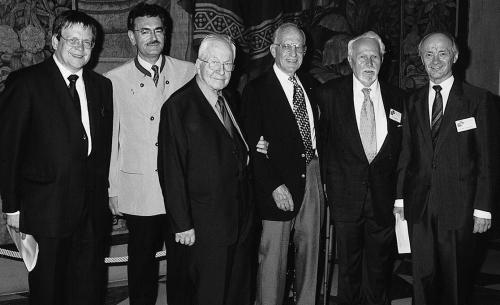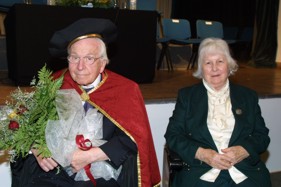.
Griechische Wissenschaftler

John H. Argyris (Ioannis Hatziargyris) (Ιωάννης Αργύρης) (19.8.1913, Volos / Greece - 2.4.2004 Stuttgart, Germany) son of Nikolaos Hatzyargyris and Loukia Karatheodoris (later the wife of the Greek Prime Minister Themistocles Sofoulis). Outstanding specialist in the field of computers, aeronautics and mechanics of fluids, member of the Royal Aeronautic Society of London and of the American Society of Mechanical Engineers, honorary member of the New York Academy of Sciences and of the Romanian Academy. His activity is reflected by around 500 studies and by his participation to various European scientific programs in the mechanics of fluids and computer applications.
John Argyris was born in Volos, Greece, into a Greek Orthodox family of mathematical notorieties. Indeed, his great uncle was Professor of Mathematics Constantine Caratheodory of the University of Munich, a world renowned mathematician and recipient at the time of the world's highest mathematical honour. After studying engineering for four years at the Technical University of Athens, Argyris’s father decided to send him to Germany to complete his studies. One of the reasons that he left Greece is that one of his Professor's, Protopapadakis, was against him due to the support of Argyris family of Venizelos. His mother wanted him to go to England for this purpose but John Argyris's authoritarian father insisted that he went to Germany. There were two reasons why his mother wanted him to go to Britain. Firstly, her sisters were living there (unknown at the time one of his aunt's sons would give his life as a British pilot in the Battle of Britain) and his younger brother was serving in the Royal Navy. Secondly, John Argyris had a great contempt for the Nazis and what they stood for in pre 2nd World War Europe. He completed his Diploma in Engineering at the University of Munich with a pass of 9.95, the maximum being an unprecedented 10. Indeed, the German professors said that they were completely astonished at John Argyris's capabilities and his work at such an early age. He then looked for the first time in his life for employment in the world-at-large. He was employed by a private consulting organisation working at the leading-edge technical design of highly complex structures. One of these early incredible engineering accomplishments was that of designing a 320 metres high radio transmitter mast with a heavy mass concentrated at the top - at the time an unresolvable problem. He was imprisoned by the Nazi's for some time but with the help of Admiral Canaris he escaped and went to Switzerland where he continued his studies in Zürich (ETH). Before he was arrested in Spain but again he escaped and via Portugal he arrived in England.
Inventor and creator of the Finite Element Analysis (including contributions from R. W. Clough and O. C. Zienkiewicz and the early mathematical work of Richard Courant) which Revolutionized Engineering Sciences, Director of the Institute for Computer Applications, University of Stuttgart, Germany, Emeritus Professor of Aeronautical Structures at Imperial College of Science, Technology and Medicine University of London; Honorary Professor of the Northwestern Polytechnic at the University of Xian China, Honorary Professor of the Technical University of Beijing China, Honorary Professor of the Qinghua University Beijing China, World prize in Culture and the 1984 Personality of the Year of the Centro Studie Ricerce delle Nazione Academy Italia, Silver Medal RAeS, Von Karman Medal ASCE, Copernicus Medal, Timoshenko Medal ASME, B Laskowitz Award with Gold Medal, Daidalus Gold Medal, Gold Medal Bulgarian Academy of Sciences, Henri Coenda Medal in Gold, Gold Medal Land Baden-Wurttemberg, Grand Cross of Merit of the FRG and Grand Cross of Merit with Star of the FRG, Stuttgart, Germany. (Chairman of The WIF).
Einstein Award
Prof. John Argyris FIC FRS FREng FRAeS has been awarded the Einstein Award, one of the United States of America's highest distinctions. The Award was given by the Einstein Foundation for his momentous work on the Finite Element method and Chaos Theory. To date, Professor Argyris has been presented with the pre-eminent scientific and engineering awards from 16 industrialised nations of the world including 5 G8 countries.
Royal Medal
Prof. John Argyris for his great contribution to the development of finite element analysis and its application to the solution of engineering problems. (1985 given also to John Bertrand Gurdon and Roger Penrose)
Professor John Argyris was presented with the Prince Philip Medal of the Fellowship of Engineering for his invention of Finite Element Analysis (the world’s most advanced mathematical tool) by HRH the Prince Philip. The award is only given for momentous achievements in the history of Engineering. Only five medals have ever been awarded and those previously honoured include the inventor of the ‘Jet Engine’ (which changed the world) - Sir Frank Whittle and the inventor of ‘Fibre Optics’ (which is continually changing the world) Naturalised American and British educated Professor Charles Kao.


The involvement of the ICA in the development of finite element methods dates back to the very beginnings of this technology. Professor John Argyris, director of the Institute for almost 40 years, was one of the inventors of the finite element method in the 1950's and has been engaged in its remarkable progress ever since. This work has resulted in several commercial software products that are still widely used in Europe
He is well known for his contribution to the solution of the problem of the heat protection of the NASA space shuttle during the entrance into the atmosphere.
Prof. John Argyris died 2th April 2004 in Stuttgart, Germany.
He was married with Elmira Rangavi and later with Ingalisa Johanson (Sweden) (mother of his son Holger Nikolaos Argyris).
The World Wide Web has not been around for long, but with over 67,000 Web sites either dedicated to or which extensively utilise the Finite Element Method, or the Finite Element Analysis, and growing by the week, it is a clear indication of the greatness of the revolutionary invention of John Argyris. Indeed, some leading engineers in the world today have already commented that the FEM will, in the latter part of the 21st century, become an equivalent tool to Newton's CALCULUS.
In response to the Dongarra and Sullivan list, Dan Givoli published a list of the 20th Century numerical algorithms and methods that have most influenced the field of computational mechanics:
- the Finite Element Method (including the Boundary Element Method);
- Iterative Linear Algebraic Solvers, include Krylov Spaces, Conjugate Gradient Methods, and GMRES;
- Algebraic Eigenvalue Solvers, including the Lanczos and QR methods;
- Matrix Decomposition Methods, including spectral and polar decomposition;
- Finite Difference Methods for Wave Problems, including the methods of Newmark, Lax-Wendroff, Hilbert-Hughes-Taylor, the shock wave techniques of Godunov, upwinding and flux-splitting;
- Nonlinear Algebraic Solvers, including Quasi Newton methods such as BFGS, and arclength or continuation methods;
- the Fast Fourier Transform;
- Nonlinear Programming, in particular, Quadratic Programming
- Soft Computing Methods, such as neural networks, genetic algorithms, and fuzzy logic.
- Multiscale methods, including the multigrid method and wavelets.
-
Pro Dongarra and Sullivan, Top Ten Algorithms of the Century, Computing in Science and Engineering, January/February 2000.
-
Dan Givoli, The Top 10 Computational Methods of the 20th Century, IACM Expressions, Number 11, September 2001, pages 5-9.
-
Anon., Scientific Discovery, June-October 2004-page 3. Available at www.thewif.org.uk
-
More information available by:
-
John Vlachopoulos. John H. Argyris, Engineering Pioneer, Innovator and Visionary (1913-2004) (Word File)
| Ancient Greece
Science, Technology , Medicine , Warfare, , Biographies , Life , Cities/Places/Maps , Arts , Literature , Philosophy ,Olympics, Mythology , History , Images Medieval Greece / Byzantine Empire Science, Technology, Arts, , Warfare , Literature, Biographies, Icons, History Modern Greece Cities, Islands, Regions, Fauna/Flora ,Biographies , History , Warfare, Science/Technology, Literature, Music , Arts , Film/Actors , Sport , Fashion --- |

